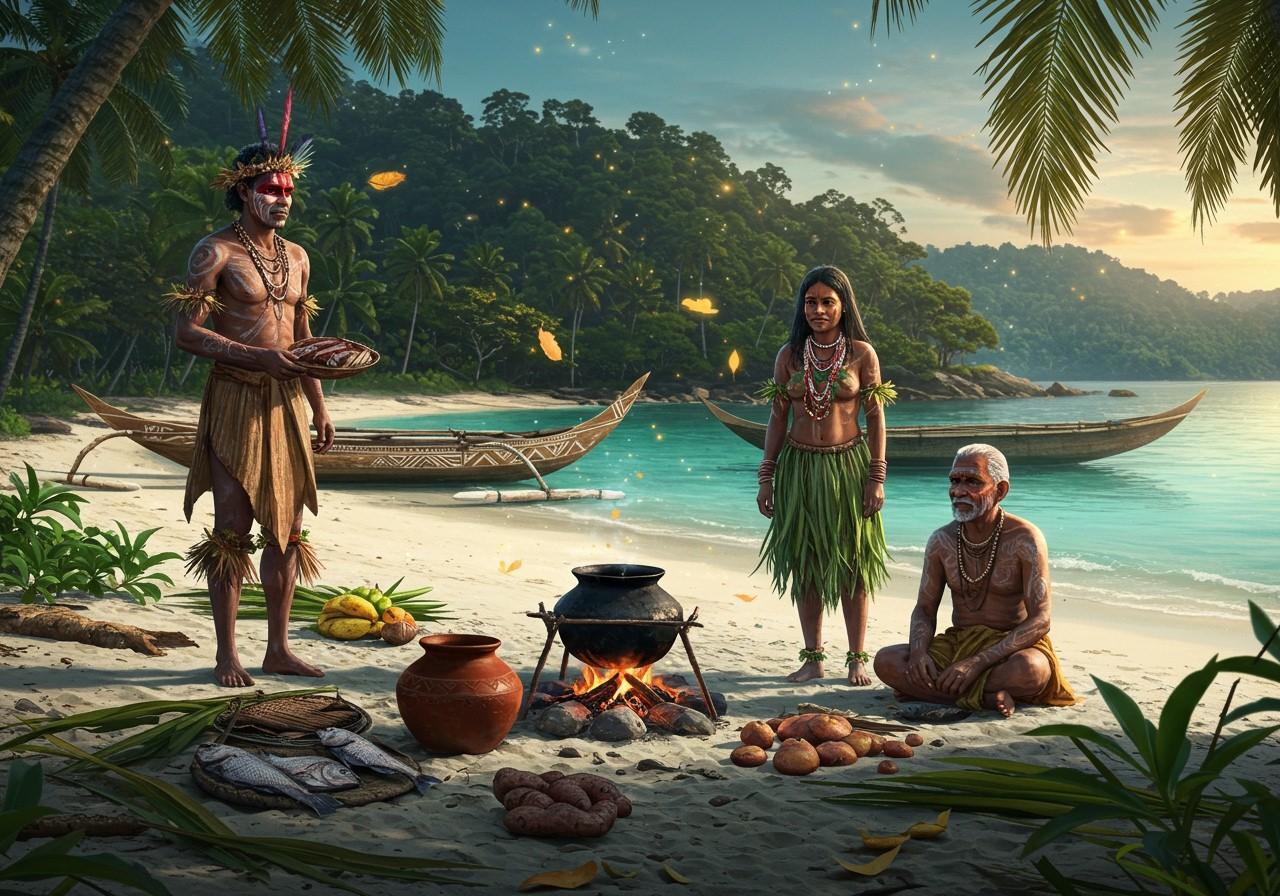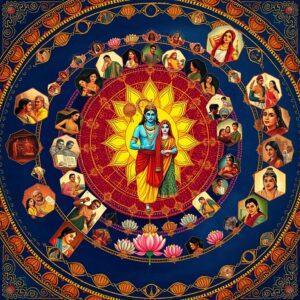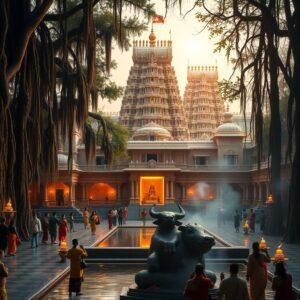
The Andaman and Nicobar Islands, nestled in the Bay of Bengal, offer a captivating blend of natural beauty and cultural richness. This archipelago, steeped in history and tradition, provides a unique glimpse into a world where ancient customs thrive alongside modern influences. These islands are renowned for their indigenous tribes, who have remarkably preserved their distinct cultures, customs, and traditions for millennia. This blog post delves into the vibrant cultural heritage of the Andaman and Nicobar Islands, exploring its indigenous tribes, diverse culinary scene, artistic traditions, and the ongoing efforts to preserve this unique legacy.
The Indigenous Tribes: Guardians of Tradition
The Andaman and Nicobar Islands are home to several indigenous tribes, each with its own distinct lifestyle and traditions. The Great Andamanese, once a dominant group, now represent a smaller community. The Jarawa, known for their hunter-gatherer lifestyle, have largely maintained their isolation, resisting external influences. The Onge, one of the oldest tribes, face dwindling numbers, highlighting the importance of preservation efforts. The Nicobarese, a more populous tribe, have adapted to modern influences while preserving their cultural identity, demonstrating a remarkable balance between tradition and progress. The Sentinalese, famously isolated, continue to reject contact with the outside world, posing unique challenges for understanding and preservation. Finally, the Shompens, a semi-nomadic tribe inhabiting the Nicobar Islands, maintain their traditional way of life, offering valuable insights into the region’s rich history.
Cultural Influences and Culinary Delights
The Andaman and Nicobar Islands stand as a vibrant cultural mosaic. Influences from Hindu, Christian, Muslim, and Sikh religions intertwine seamlessly, enriching the islands’ unique identity. This harmonious blend of spiritual traditions creates a tapestry of cultural exchange and mutual respect.
The culinary landscape mirrors this diversity, offering a tantalizing array of flavors. From spicy fish curries that capture the essence of the islands’ fresh seafood to the aromatic crab masala and grilled lobster, each dish is a culinary adventure. Indigenous spices and herbs enhance the flavors, providing a unique taste of the region. Street food further elevates the culinary experience, offering a blend of local and global influences with an emphasis on fresh, locally sourced seafood. This vibrant culinary scene is a testament to the islands’ dynamic cultural exchange.
Artistic Expressions and Traditional Practices
Arts and crafts in the Andaman and Nicobar Islands combine indigenous techniques with modern innovations. Basket weaving and wood carving, passed down through generations, showcase the islanders’ creativity and cultural heritage. These intricate crafts, often made from natural materials, represent a tangible link to the islands’ rich history.
Festivals, such as the Nicobar Dance Festival, celebrate the islands’ artistic spirit, bringing communities together in joyous celebration. These vibrant events showcase traditional music, dance, and storytelling, reinforcing cultural identity and fostering a sense of belonging. Traditional medicine also holds a significant place in island life, with tribes utilizing ancient healing practices derived from nature’s bounty. Oral storytelling, a cherished tradition, preserves history and transmits wisdom to younger generations, ensuring the continuity of cultural knowledge.
Preservation Efforts and Sustainable Tourism
Despite their rich heritage, the Andaman and Nicobar Islands face challenges in preserving their cultural traditions. Modernization and globalization pose threats to age-old practices, emphasizing the need for proactive preservation efforts. Government initiatives and NGO advocacy play crucial roles in safeguarding tribal ways of life and cultural integrity. Environmental changes, including the impact of the 2004 tsunami, add further complexity to these efforts. Balancing tourism with cultural preservation is paramount, ensuring that economic benefits do not compromise the islands’ cultural and ecological balance.
How Poojn.in Supports Your Spiritual Journey in Andaman & Nicobar
Poojn.in recognizes the deep spiritual connection between the Andaman and Nicobar Islands and the reverence for Lord Shiva. We are dedicated to supporting your spiritual practices by providing authentic puja items and materials, delivered conveniently to your location in the islands. For devotees seeking to honor Mahadeva, we offer a comprehensive selection of high-quality products:
- Pure copper kalash sets for abhishekam rituals: These beautifully crafted kalash sets are ideal for performing traditional abhishekam rituals, allowing you to honor Lord Shiva with reverence and devotion. They are made from high-quality copper, known for its spiritual significance.
- Premium quality rudraksha malas: Our rudraksha malas are sourced from reputable suppliers and are known for their authenticity and spiritual potency. Choose from a variety of sizes and styles to enhance your meditation and prayer practices.
- Traditional brass bells (ghanta) for aarti: Add a touch of traditional elegance to your aarti ceremony with our handcrafted brass bells. The resonant sound of the bell is believed to invoke positive energy and enhance spiritual connection.
- Pure silver items for Shiva puja: Elevate your Shiva puja with our collection of pure silver items, including diyas, plates, and bowls. These items add a touch of purity and devotion to your worship.
- Authentic bilva leaves and dhoop: Sourced directly from India, our bilva leaves and dhoop are essential offerings for Lord Shiva. They add an authentic touch to your puja and enhance the spiritual atmosphere.
- Complete puja thalis with all essential items: Simplify your puja preparations with our complete puja thalis, containing all the necessary items for a proper and fulfilling worship experience. These thalis are carefully curated to ensure convenience and authenticity.
Our curated Shiva puja collections ensure you have everything needed for proper worship during significant festivals like Maha Shivaratri and Shravan Maas. We offer timely delivery across major locations in the Andaman & Nicobar Islands, including Port Blair, Havelock Island, and Neil Island. Our customer service team is available to provide guidance on puja procedures and product selection. Visit www.poojn.in to explore our complete range of Shiva puja items.
Embracing the Spirit of Andaman and Nicobar
The Andaman and Nicobar Islands offer more than just picturesque landscapes; they offer a journey into a world rich in cultural heritage. From the harmonious coexistence of diverse religious influences to the vibrant culinary scene, every aspect of these islands reflects a celebration of life. The arts, crafts, and traditional practices stand as testaments to the islanders’ resilience, creativity, and deep connection to their ancestral heritage. Visitors have the privilege of engaging with this vibrant culture, exploring bustling markets, savoring local delicacies, and witnessing captivating arts and festivals. By embracing the spirit of the Andaman and Nicobar Islands, we not only gain a deeper appreciation for their rich legacy but also contribute to its preservation for future generations.
FAQs on Andaman and Nicobar’s Cultural Heritage
What defines the unique culture of the Andaman and Nicobar Islands? The culture is a vibrant blend of indigenous traditions, colonial influences, and evolving modern practices. Home to diverse tribes like the Great Andamanese, Onge, and Jarwa, each community contributes unique customs and traditions to this rich tapestry.
Which tribes are most prominent in the Andaman and Nicobar Islands? The Great Andamanese, Onge, Jarwa, and Sentinalese are among the major tribes, each with distinct languages, customs, and lifestyles deeply intertwined with their natural surroundings. The Nicobarese, a larger tribe, demonstrates an impressive ability to adapt to modern influences while preserving their cultural heritage.
What are some culinary specialties of the Andaman and Nicobar Islands? Seafood dominates the culinary landscape, with dishes like fish curry, grilled lobster, and coconut prawn curry being local favorites. Traditional tribal cuisines often incorporate wild roots, local greens, and other natural ingredients, prepared with simple cooking methods that highlight the fresh flavors.
Why is preserving the tribal cultures of Andaman and Nicobar so important? These cultures offer a rare glimpse into ancient ways of life that have remained largely unchanged for centuries. The unique traditions, languages, and practices of these tribes contribute significantly to the islands’ cultural diversity and provide invaluable insights into human history and adaptation.
How do the tribes of Andaman and Nicobar celebrate their traditions? Festivals, dances, and rituals are integral to the cultural expression of these tribes. These celebrations often involve music, storytelling, communal feasting, and other activities that strengthen community bonds and celebrate their connection to nature and their ancestors.
What role does food play in the culture of Andaman and Nicobar? Cuisine is not merely sustenance; it is a reflection of the islands’ rich biodiversity and the diverse influences of various communities. Traditional dishes, prepared with fresh, locally sourced ingredients, represent an integral part of cultural identity and offer a unique culinary experience.
How can visitors immerse themselves in the culture of Andaman and Nicobar? Attending local festivals, exploring tribal art and crafts, and savoring traditional foods offer immersive experiences. Engaging respectfully with local communities and learning about their history and traditions can deepen understanding and appreciation for the islands’ cultural heritage.
What traditional crafts are practiced by the tribes of Andaman and Nicobar? Basket weaving, wood carving, and shell crafts are among the traditional artistic expressions of these tribes. These crafts are not only artistic but also practical, with items often used in daily life and made from natural materials found on the islands.


